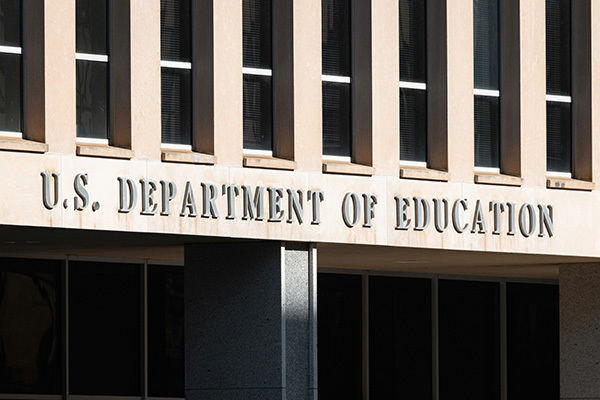Nebraska education leaders see plan to close US Department of Education as 'disastrous'
September 14, 2025
Leaders in Nebraska’s education community say the dismantling of the federal Department of Education could have “catastrophic” effects, such as reductions in funding for lower-income students and those with disabilities and the elimination of protections guaranteeing equal access to education.
While the dismantling of the federal department has not yet been fully carried out, the effects of cuts at the federal level are already being felt in Nebraska, according to some in the state’s education field.
President Donald Trump campaigned on the promise of dismantling the Department of Education. In March, he signed an executive order directing Education Secretary Linda McMahon to work toward the department’s closure.
While fully eliminating the department would require congressional approval, the Trump administration has worked to shrink its workforce and cut funding.
After lower courts questioned the legality of efforts to lay off nearly half of the department’s workforce, the Supreme Court ruled in July that Trump and McMahon could move forward with the mass layoffs.
Trump has said all federal funding will be retained and central functions of the agency could be transferred to other departments. He’s also argued that the move will shift the oversight of education “back to the states.”
Tim Royers, president of the Nebraska State Education Association, said he doesn’t think that argument holds up.
“The issue is state departments of education had been built knowing the Federal Department of Education exists and there’s no duplication of function,” he said.
Royers said much of the general public doesn’t know what the federal department does, but he fears that could become clear very quickly if those functions are taken away.
“Every family in Nebraska that receives a public education has been positively impacted by federal resources,” he said. “They’re going to realize that too late, and they’re going to realize it when some of the most important programs to support their kids get cut.”
Federal civil rights office behind on investigating complaints
While state education departments are tasked with curriculum and certification, the federal department is largely focused on enforcement and compliance.
That includes the work of the Office of Civil Rights, which handles cases related to civil rights laws, including those related to sexual assault, racial harassment, disability discrimination and breaches of privacy.
If the enforcement component of the federal department were eliminated, a compliance and enforcement system would have to be created from scratch at the state level.
Royers said there’s no infrastructure at the state level to take over those cases, and creating that infrastructure would be time-consuming and costly.
“Not only would there be some kind of drop-off in ensuring that every student and every family gets the education they deserve, it would be a massive increase in expense at the state level,” he said.
The office has investigated several cases in recent years in Nebraska, according to Elizabeth Eynon-Kokrda, general counsel and co-founder of the Education Rights Counsel. The Nebraska-based nonprofit focuses on providing advocacy and legal support to ensure students get the education they are entitled to.
Between 2020 and 2024, the federal civil rights office considered disability and discrimination-related cases in more than 10 Nebraska districts, according to Eynon-Kokrda.
“These examples show that OCR is not an abstract federal office,” she said in a statement to The World-Herald. “It is a lifeline for families across Nebraska.”
The office’s operations have already been impacted after half of the office’s staff was laid off in March, leaving a backlog of unresolved cases.
A public case list previously updated weekly has not been updated since January.
Eynon-Kokrda said the lack of action by the office has meant more demand for direct legal representation from the nonprofit.
“With fewer avenues for federal oversight, we are stepping in more often as the only line of defense for families,” she said.
“With fewer avenues for federal oversight, we are stepping in more often as the only line of defense for families.”
Fears over federal funding cuts create 'chilling effect'
Nebraska received about $243 million in federal education funding during the 2023-24 school year without including pandemic-related grants. Of that federal funding, about $49 million was issued as Title I funding for low-income schools and $86 million for special education through the Individuals with Disabilities Education Act.
While Trump has said there wouldn’t be changes to funding, Royers said there would inevitably be impacts as the administration has proposed moving to block grants instead of the current system where funds are directly issued for specific programs.
That would mean states would have to create the infrastructure to distribute funds for specific uses and monitor their usage.
“Something’s going to get lost there,” Royers said.
Panic arose across the education sector in July when the Trump administration froze billions in funding promised to schools for the upcoming school year. While those funds were eventually released, Royers said it was part of an erosion in trust in federal funding that may lead to districts cutting programs or moving funding from other sources instead of relying on federal funds.
“To completely eliminate the department will be fundamentally catastrophic,” Royers said. “But we’re already seeing the foreshocks of the earthquake, and we’ve got to deal with the damage from those.”
At a recent budget hearing, Omaha Public Schools officials discussed the district’s proposed 2025-26 budget, which included a $10 million increase in the district’s contingency fund. Shane Rhian, the district’s chief financial officer, said the funding freeze in July threatened $8 million of the district’s funding.
“With the understanding of what happened earlier this summer ... it became very imperative to add an additional $10 million to that contingency budget,” Rhian said.
Eynon-Kokrda said the instability of education at the federal level and the strain it is placing on school districts could lead to more teachers leaving the profession at a time when many schools are still struggling with teacher shortages.
It could also push wealthier families to choose to enroll their children in private schools, while lower-income families are stuck in schools with dwindling resources, Eynon-Kokrda said.
Royers said the hardest aspect of the federal cuts is not knowing when the next change will be announced and having to be ready to jump in and tackle the next challenge at a moment’s notice.
“It’s kind of like triage,” he said. “We have to take it a week at a time.”


